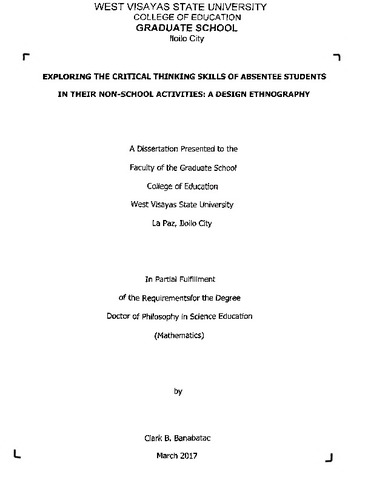Exploring the critical thinking skills of absentee students in their non-school activities: A design ethnography
Share
Zusammenfassung
This qualitative research brought to light the critical thinking skills developed by the absentee students in one public secondary school in the Fifth District of the Province of Iloilo. Five participants were purposively selected based on their absences and responses to the checklist of non-school activities. Design ethnography was used to determine the critical thinking skills manifested by the absentee students in their non-school activities, the non-school activities that developed their critical thinking skills, the ways on how they developed their critical thinking skills, and the instructional materials appropriate for them. The principles of constructionism and interpretivism backed up the domain, taxonomic, componential, and thematic analyses of data. Participant observation, ethnographic interview, and journal writing were used to triangulate the results. The emerging themes revealed that the absentee students learned their interpretation, analysis, inference, evaluation, explanation, and self regulation skills as they engaged in non-school activities. Interpretation subskills that were used were categorizing, applying alternatives in communicating measurements, decoding values and figures through estimation and representation, and clarifying quantities. On the other hand, the analysis subskills that were applied were examining quantities and identifying reasons. It was shown that livelihood activities, household activities, and games developed the critical thinking skills of the absentee students. Livelihood activities included harvesting rice, taking care of animals, gardening, charcoal making, fishing, feeding offish in the pond, taking care of mini-store, and haircutting. Household activities included cooking rice; washing clothes; taking care of younger sister, brother, nephew, or niece; fetching water; and cleaning the house. Games included ball games, card games, board games, racket game, computer and cellular phone games, and Larong Lahi. It was further revealed that the absentee students developed critical thinking skills through training and observation at home, through observation and participation in the activities in the community, through motivation and encouragement in school, and through the influence of social media and support of significant others. Consequently, however, those ways are directed into one main theme, Agents of Informal Learning. Five sample modules aimed at developing the critical thinking skills of absentee students were designed. These modules included students' non-school activities and covered five main topics: direct variation, inverse variation, joint and combined variations, proportion, and the Pythagorean Theorem and its application. A teacher guide was also developed. Further studies may be conducted to test the effectiveness of the sample modules and to dig for deeper knowledge about the critical thinking skills and mathematics principles available in the community. The continuous method of searching and bringing knowledge from the community into the classroom could lead to better education and could improve students' regard to education.
Recommended Citation
Banabatac, C. B. (2017). Exploring the critical thinking skills of absentee students in their non-school activities: a design ethnography. [Doctoral dissertation, West Visayas State University]. WVSU Institutional Repository and Electronic Dissertation and Theses PLUS.
Type
DissertationKeywords
Schlagwort
Degree Discipline
MathematicsDegree Name
Doctor of Philosophy in EducationDegree Level
DoctoralPhysical Description
xix, 394 p. : ill. (col.).


